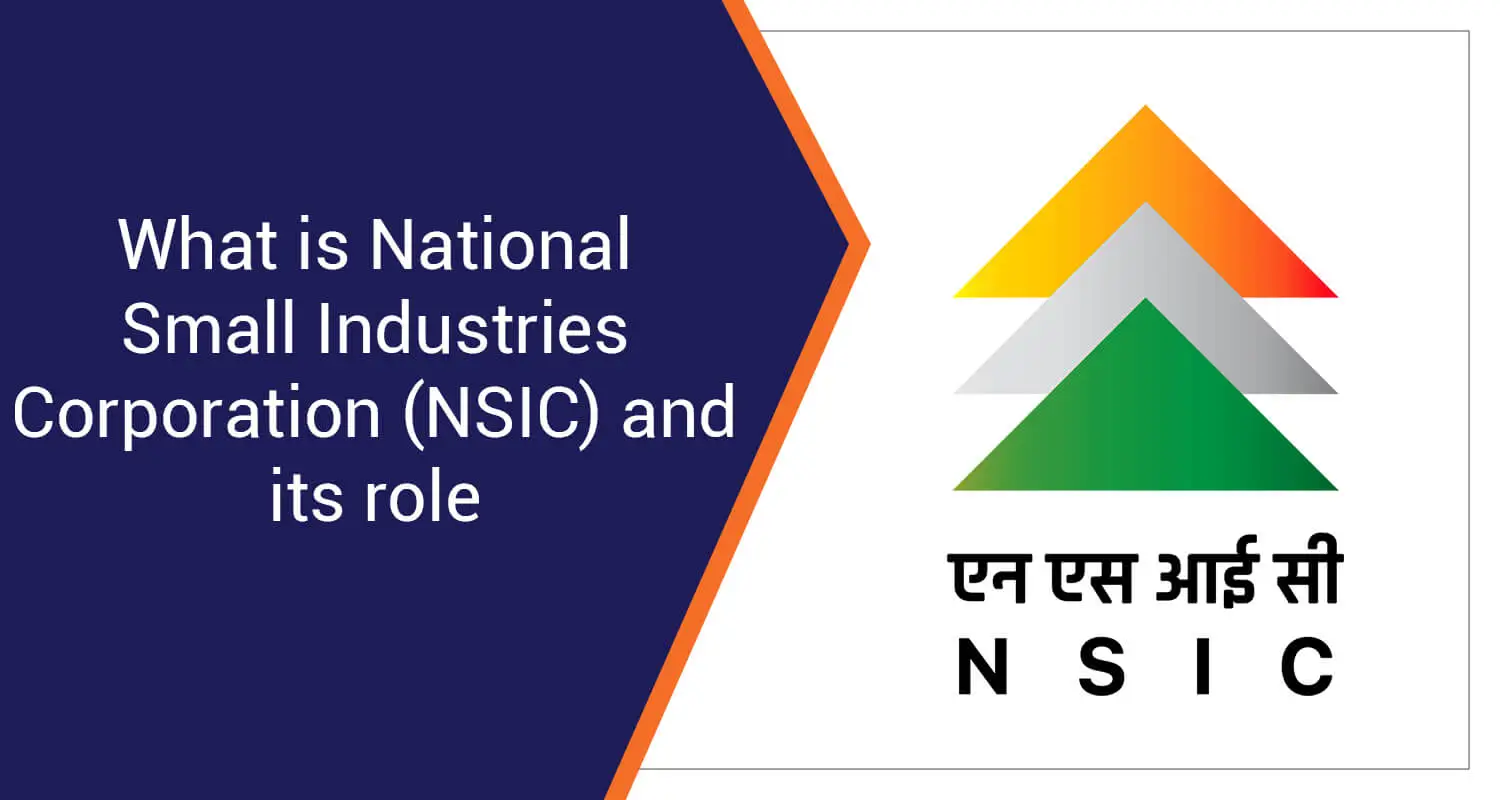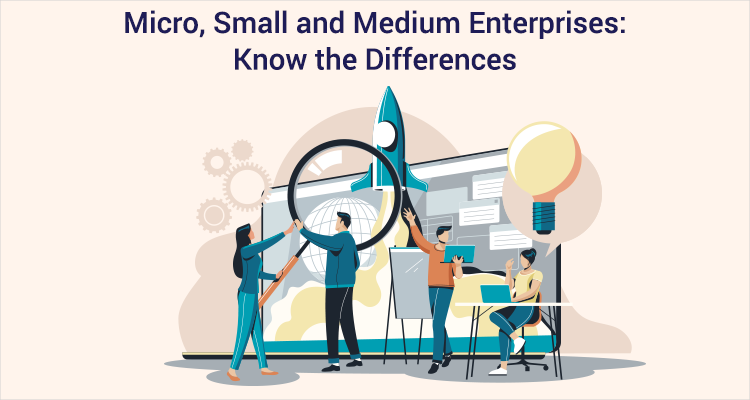What is National Small Industries Corporation (NSIC) and its Role
Table of Contents
The National Small Industries Corporation (NSIC) has been actively working for over six decades to empower MSMEs (Micro, Small and Medium Enterprises) and contribute significantly to the Indian economy. Operating under the Ministry of MSME, NSIC plays an important role in their growth by offering a comprehensive support system. This includes facilitating marketing opportunities, providing access to technology and finance, and offering various other services designed to equip MSMEs with the tools they need to compete effectively.
This article delves into the details of NSIC, its functions, and the various ways it supports MSMEs in their journey toward success.
What is NSIC?
NSIC is a government agency established in 1955 to help and support Micro, Small and Medium Enterprises (MSMEs) in India. It functions with the primary objective of promoting, aiding, and fostering the growth of MSMEs across the nation and is an ISO 9001:2015 certified Government of India Enterprise.
Features of NSIC:
- Government Agency: NSIC operates under the Ministry of MSME, making it a reliable and trustworthy institution for MSMEs.
- Extensive Network: NSIC has a vast network of offices and Technical Centres spread across the country, ensuring accessibility and support to MSMEs in various regions.
- Wide Range of Services: NSIC offers a comprehensive range of services including marketing, technology, finance, and other support systems specifically designed to cater to the needs of MSMEs.
- Focus on Growth: NSIC's core mission revolves around helping MSMEs to achieve sustainable growth and compete effectively in the market.
Organizational Structure of the National Small Industries Corporation (NSIC)
Governance:
- NSIC's policy direction is set by a Board of Directors comprising a full-time Chairman/Managing Director, two functional directors, a representative from SIDBI, two government nominees, and six independent part-time directors. This diverse group of experts oversees the corporation's overall management.
Extensive Network:
- NSIC boasts a vast national network with 123 offices spread across India and one in South Africa. This ensures widespread accessibility and localized support for MSMEs in various regions.
Team and Infrastructure:
- NSIC is backed by a team of over 500 dedicated professionals across the country. Its operations are further supported by nine zonal offices, 33 branch offices, 14 sub-offices, 10 Business Development Extension Offices, five technical services centres, three extension centres, and two software technology parks. This extensive infrastructure allows NSIC to cater to the diverse needs of MSMEs efficiently.
Types of NSIC Schemes:
NSIC offers a variety of schemes designed to support MSMEs in different areas. Some prominent examples include:
- Single Point Registration Scheme: Facilitates increased government procurement from MSMEs.
- Raw Material Assistance Scheme: Provides financial assistance for purchasing raw materials from local and global markets.
- MSME Global Mart: A B2B platform offering technology and financial assistance at competitive rates.
- Consortia and Tender Marketing Scheme: Promotes and markets products manufactured by participating MSMEs.
Sapna aapka. Business Loan Humara.
Apply NowKey Functions of NSIC
Here's a breakdown of its key functions:
Business Support Services: NSIC offers a comprehensive suite of services to assist MSMEs in various areas:
- Marketing Assistance: Helping MSMEs identify and explore new markets, participate in trade fairs, and utilize online platforms to boost their visibility and sales potential.
- Raw Material Procurement Assistance: Facilitating access to raw materials at competitive prices through bulk procurement and tie-ups with suppliers.
- Technology Support: Providing access to advanced technologies, testing facilities, and skill development programs to enhance production capabilities and product quality.
Credit Facilitation: NSIC acts as a bridge between MSMEs and financial institutions, offering:
- Tie-ups with Banks and Financial Institutions: Providing access to credit at attractive interest rates and flexible repayment terms.
- Credit Guarantee Schemes: Facilitating collateral-free loans and guarantees to ease the financial burden on MSMEs.
Training and Consultancy: NSIC equips MSMEs with the knowledge and skills needed for success through:
- Training Programs: Covering different areas of business management, finance, marketing, human resources, and operations.
- Consultancy Services: Offering expert guidance on specific business challenges and opportunities.
Technology Upgradation: NSIC promotes technological advancement in MSMEs by:
- Technology Upgradation Programs: Providing financial assistance and technical expertise for adopting new technologies and infrastructure.
- Technology Transfer Centres: Offering access to advanced equipment and expertise for enhancing production efficiency and competitiveness.
Export Promotion: NSIC assists MSMEs in entering the global market through:
- Export Promotion Programs: Providing guidance on international trade regulations, market research, and export procedures.
- Facilitating Participation in Trade Shows and Exhibitions: Connecting MSMEs with potential international buyers and partners.
Entrepreneurship Development: NSIC fosters a culture of entrepreneurship through:
- Entrepreneurship Development Programs: Offering training, mentorship, and support to aspiring entrepreneurs in various aspects of business development.
- Incubation Centres: Providing infrastructure and resources to help startups grow and thrive.
Benefits of NSIC Registration and NSIC MSME Certificate
The National Small Industries Corporation (NSIC) extent many benefits to MSMEs in India. An NSIC MSME certificate, also known as a Single Point Registration Scheme (SPRS) certificate, is a document issued by the National Small Industries Corporation (NSIC) to registered Micro and Small Enterprises (MSEs).
Here are some key advantages:
- Enhanced Market Access: NSIC facilitates access to government procurement programs, reserving specific items exclusively for MSME suppliers. This opens doors to lucrative contracts and expands market reach.
- Reduced Tender Participation Costs: NSIC registration eliminates the need for tender fees and Earnest Money Deposit (EMD), significantly lowering the financial barrier to participating in government tenders.
- Competitive Edge: MSMEs registered with NSIC may be eligible for price preference, allowing them to compete more effectively against larger players. Additionally, NSIC facilitates consortium formation for joint bidding on larger projects.
- Financial Assistance: NSIC provides financial support through various schemes, including credit guarantees from banks, raw material assistance for purchasing essential supplies, and access to MSME Global Mart, a B2B platform offering competitive financial and technological solutions.
- Technological Upliftment: NSIC's network of Techno centres offers MSMEs access to advanced technology, testing facilities, and skill development programs, enhancing their production capabilities and product quality.
- Marketing and Branding Support: NSIC assists MSMEs in marketing their products through participation in trade fairs, online platforms, and export promotion initiatives, boosting their visibility and sales potential.
Working Mechanism of NSIC
NSIC operates through a well-structured framework to deliver its services and support effectively to MSMEs. Here's a breakdown of its working mechanism:
- Schemes and Programs: NSIC implements a diverse range of centrally sponsored schemes designed to address the specific needs of MSMEs in various areas like marketing, finance, technology, raw materials, and skill development.
- Technical Support: NSIC's network of Techno centres provides MSMEs with access to advanced technology, testing facilities, training programs, and consultancy services to enhance their production capabilities and product quality.
- Marketing Assistance: NSIC acts as a bridge between MSMEs and potential buyers, both in the domestic and international markets. It organizes trade fairs, participates in government procurement programs, and facilitates online marketing initiatives to boost the visibility and sales of MSME products.
- Financial Support: NSIC offers various financial schemes to MSMEs, including credit guarantees, raw material assistance schemes, and MSME Databank services that connect them with potential lenders.
Conclusion
The National Small Industries Corporation (NSIC) plays a pivotal role in nurturing and empowering MSMEs, which are the backbone of the Indian economy. Through its comprehensive support system, NSIC equips MSMEs with the tools and resources they need to thrive in a competitive market.
FAQs
Q1. Is NSIC a government body?
Ans. Yes, NSIC is a government agency functioning under the Ministry of MSME.
Q2. How can MSMEs register with NSIC?
Ans. MSMEs can register with NSIC through their official website or by visiting one of their regional offices.
Q3. What is the NSIC MSME certificate?
Ans. The NSIC MSME certificate, also known as the Single Point Registration Scheme (SPRS) certificate, is issued to registered Micro and Small Enterprises (MSEs). It signifies that the MSME has been verified and registered by NSIC, meeting the eligibility criteria.
Q4. How can MSMEs register with NSIC?
Ans. MSMEs can register with NSIC through their official website or by visiting one of their regional offices. The registration process involves meeting eligibility criteria and submitting necessary documents.
Sapna aapka. Business Loan Humara.
Apply NowDisclaimer : The information in this blog is for general purposes only and may change without notice. It does not constitute legal, tax, or financial advice. Readers should seek professional guidance and make decisions at their own discretion. IIFL Finance is not liable for any reliance on this content. Read more




